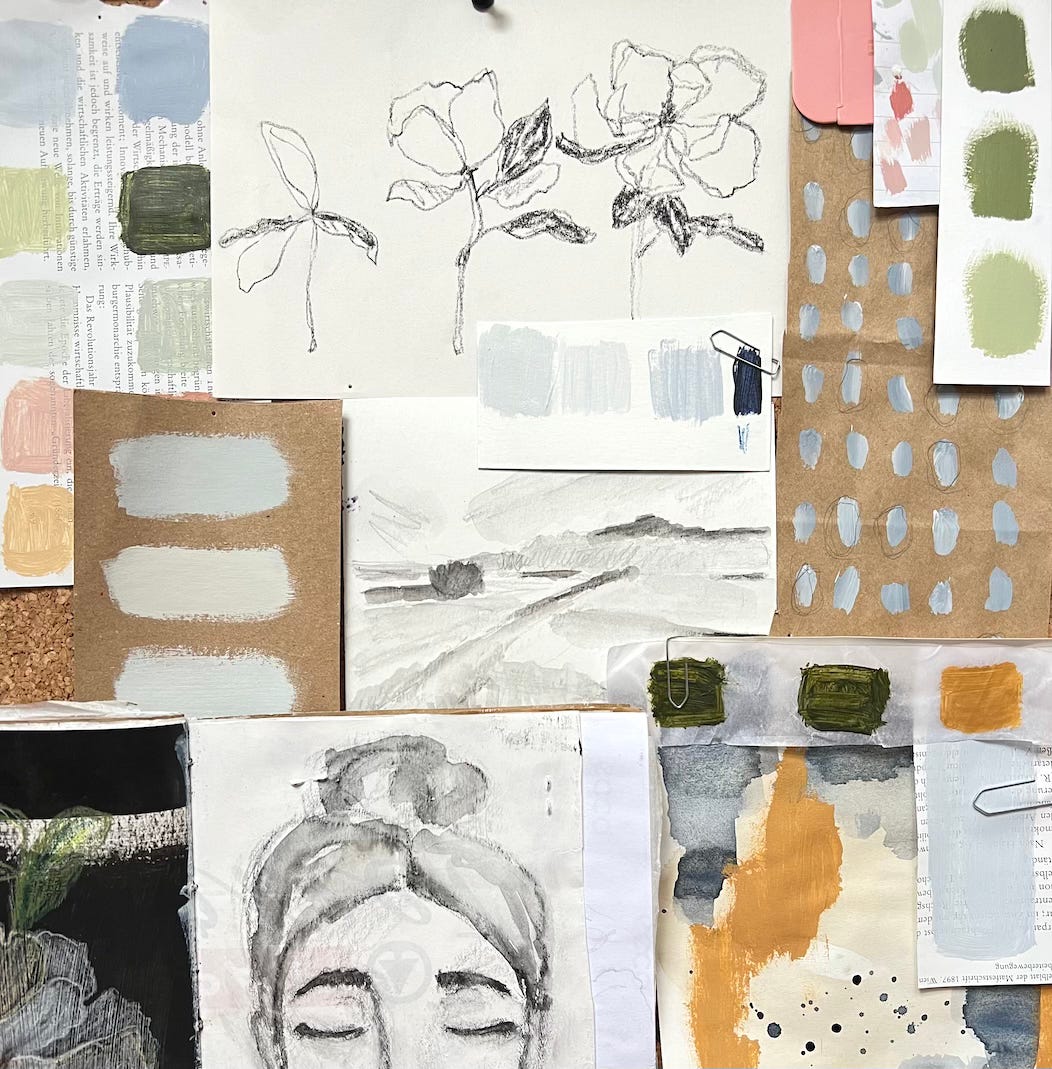Focus in art practice for beginners
As artists we all go through different stages in our creative journey.
I decided to dive deeper into the topic, because I wanted to figure out for myself what should be my current focus. There are many ways to define these stages, so I included approaches from artists who inspire me personally.
Stages of development as an artist
These are very different approaches, but I found them equally useful, insightful and fun:
The Competence Ladder for artists (Angela Fehr)
The S.T.Y.L.E. acronym by Phoebe Gander (Fail Like an Artist Podcast)
How to Get (the Right) Support as a Creative (Marisa Cummings)
How to Make an Income From Your Art - 5 Key Stages (The Laura Horn Art Podcast)
I summed up the ideas and ended up with 4 stages:
Learning. Developing skills, practicing, trying various processes & styles. Deciding what you like and don’t like.
Experimenting. With more confidence in skills, you start trying new things and working on finding your unique process. Now, when you know the rules, it’s time to bend them.
Defining & refining a style. Making specific decisions about your work. A unique style that allows you to express yourself in an authentic and recognisable way.
Evolving. Reevaluating your art practice. Rejuvenating your style. Changing directions.
The main ideas behind the concept of stages in artistic practice
The length of each stage will be different for each artist. The initial, learning stage is crucial and can take quite a long time. Some people need more time to figure things out (me) and some people less (not me). You shouldn’t compare yourself to anyone but to yourself in the past. It is your progress and perseverance that matter, not that of others. Sometimes it is easier said than done, but as artists we should embrace our unique artistic journey.
I found it very helpful to understand these ideas, because sometimes I felt that I wasn’t not really sure what I was doing and where I was going as an artist. Thankfully, it seems to be normal for the learning stage and everyone is going through it (phew). This stage is when artists are the most vulnerable, because there are so many things that we need to learn, which can be overwhelming, especially, if you’re interested in so many things at once (as I am).
In one of her videos Sandy Hester said that she loves trying new things all the time (supplies, subjects, sketchbooks, etc.), but then she also recognises that this means that she will probably grow slower than someone who is very focused in their art practice.
This idea resonates with me, because I also like working in mixed media and I tend to get bored, if I work on the same thing for too long. As Sandi, I like trying new things. Now I understand that it will influence the pace of my artistic growth, but I also know that this is the way for me, because of who I am as a person and this is how I am building my skills and finding my voice. Though it is definitely useful to impose some limitations (and some existing limitations are out of my control), I am creating my best work, when I am allowing myself to try new things and experimenting with new ideas. I also like how Louise Fletcher explains the idea of finding joy in your artistic practice. She says that while all the skills like mixing colours, composition, etc. are important, the first thing that you have to do is to let go of perfectionism, inner criticism, forget about the results and just enjoy creating art.
Finding balance
After researching the topic, I started thinking, what should be the current focus in my art practice in order to move forward. I came up with several ideas and here they are:
Regular art practice (daily when possible).
Repetition is good. It helps you to build skills.
Learn and practice the basics (composition, colour, values, etc., etc.).
Embrace existing limitations (e.g., I don’t have a big studio / storage space).
Focus on studies & sketchbook practice. Works on paper. Create my own sketchbooks & art journals. Reuse materials, experiment with various papers.
Work in mixed media, try various supplies & techniques. Make notes, write down ideas & reflections.
Try new things and focus on the process, not the result. It’s ok to create messy and ugly pages, they help you to think through various ideas, move forward and find common threads and ideas in your art.
Collect inspiration & create inspiration boards.
Share your work & interact with other beginner artists.
Hope this was useful!
Until next time!
Lisa



